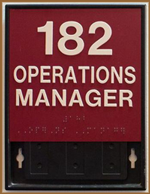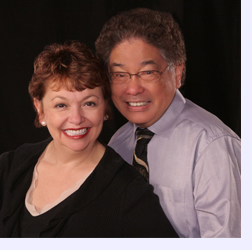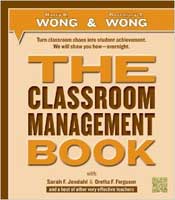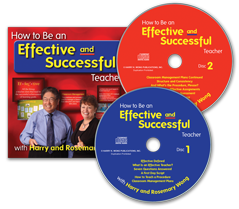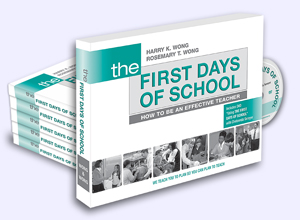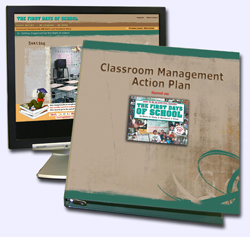|
 |

Special to the Gazette
November 2013
The Most Misunderstood Word
She created and directed the Classroom Organization and Management Program (COMP), a national program for in-service teachers on classroom management. This was a 6- to 18-week training program on classroom management and teacher effectiveness. For decades, her work has influenced how classrooms are managed and defined. She says the key word in her definition of classroom management is productive—supporting and developing orderly and productive classroom environments is the foundation of good classroom management. That’s the reason classrooms are managed, to produce students learning—but too many in education misinterpret classroom management as dealing with behavior issues. If you have a behavior problem, you manage the behavior; you do not manage the classroom. Classroom management is the most misused and Discipline Is Behavior Management Ask any educator from K-16—yes, even college instructors—for a definition of classroom management. Over 90 percent of them will say that it has to do with controlling student behavior. Now, ask any business person for a definition of management, and they will say that it has to do with managing people in order to produce a result—keeping track of them, making sure their working conditions are well-ordered, and orchestrating the matters of a business or institution to succeed. However, in education we look at management as the chore of keeping student misbehavior to a minimum, or as some people cynically say, “crowd control,” rather than getting the most out of our students. Thus, the reason we continue to have behavior issues in our classrooms and schools is because we persist in, and are preoccupied with, discipline. Simply put, that’s all we ever talk about—discipline and the INTERVENTIONS we can use to solve behavior problems. Classroom management has nothing to do with discipline. Classroom management has to do with managing the classroom to extract the students’ maximum potential for learning and achievement. Management and Leadership While researching classroom management, we searched for titles on Amazon. We entered “management” as the type of book we were looking for and had a major “aha!”
We found over 800,000 titles of books having to do with management. People in business regard management as the key to their success. Much more fascinating is that management is correlated with leadership. Leaders are people who are able to influence people to change directions or take certain actions for the benefit and future of the company. Managers manage people and organizations, and leaders lead and influence people. In business, good managers are encouraged to be leaders, because leaders lead people. That’s why there are 847,889 books on the subject! Discipline is behavior management; it is not classroom management. But, so long as people regard classroom management as discipline, the focus will always be on discipline. When do we start managing the classroom and Managers Manage, not Discipline When classroom management is viewed as discipline and control, it will not be possible to build the kinds of learning environments in which students have a stake in their own learning. Sports teams have managers. Apartment buildings have managers. Stores have managers. Their responsibilities are all the same:
Managing a classroom is no different:
The Economist magazine sponsors a forum on human potential. To realize that talent, people are managed, not disciplined.
There are many types of managers:
None of these managers have anything to do with discipline. If you own some property, you hire a property manager to manage your property. You don’t hire a property manager to discipline your tenants. If you have accumulated some assets, you hire someone to manage your finances. Or, you hire someone to manage your business, your physical exercise program, your team, or your computer network. If you take a time management class, you are taught how to make productive use of your time. We recently saw a theater’s door that was marked “Operations Manager.” On stage, there was a stage manager. Can you imagine the operations or stage manager’s job to be sending actors to the director’s office for intervention? What Classroom Management IS Classroom management is not a program, approach, curriculum, or philosophy. It is the foundation for whatever approach or program you choose to use. Classroom management is like the floor in a house. You don’t notice it, but if it is missing, you fully notice its absence. You don’t see good classroom management, but if it is missing, no matter what approach or program you are using, you will notice the chaos in the classroom. Effective teachers manage a classroom; they do not discipline a classroom. Classroom management is a means of organizing, structuring, and planning events to get things DONE in the classroom that will lead to student learning. The solution to behavior problems is right under our noses. Effective teachers know how to prevent problems and enhance student learning. They have a classroom management plan. In The First Days of School, Sarah Jondahl shares her classroom management plan on pages 213–218. Her plan was also featured in the September 2005 Teachers.net article. And, Sarah is one of the co-authors of our forthcoming book, THE Classroom Management Book. The basis of classroom management lies in procedures that form a management plan to produce the successful achievement of learning goals. Procedures are the tasks students must do to increase their chances for learning and achieving. Procedures are the foundation upon which successful teaching takes place. Procedures set students up for achievement. Having procedures simplifies the students’ task of succeeding in school and creates a positive learning environment. A routine is a procedure that students do repeatedly without any prompting or supervision. Watch the students in a well-managed classroom. They are responsible because they know the procedures and routines that structure the class and keep it organized. They are working; they are producing; they are learning and achieving. And you can go home each day with a smile on your face!
Managing Is Running an Organization We once met a college student who said he was majoring in “management.” Would you understand him to mean that he was learning how to discipline employees? Yet, that is how many educators view management. Classroom management is not about student behavior. It is about organizing a classroom so that students know what to do to learn and achieve. This first-year teacher knows what classroom management is.
It’s Prevention, Not Intervention There is too much time wasted discussing what we do not want (student misbehavior) rather than what we do want (student learning). Rather than solve the problem, we preserve the problem.
There are currently well over 5,000 conflict resolution programs used in schools. Why is a conflict resolution intervention used at all, when a classroom management plan can be used to prevent the conflict beforehand? The solution to PREVENTING discipline problems is to have a management plan for the classroom that includes procedures that govern classroom activities so that students know what to do, when to do it, and how to do it. When students know what to do responsibly, they will not do what teachers do not want them to do. The two words that are the dead giveaway when a person is talking about discipline and not management are “consequences” and “behavior.” Teachers are consistently searching for a set of consequences that can be used to coerce the student to behave. No learning takes place when a teacher disciplines a student. Learning only takes place when a student is in a well-organized and a well-taught classroom where there is a structure for learning. Classrooms Are Managed for Learning Sarah Regan of North Carolina has some advice for new teachers. She says, “It is so simple. Create a plan and work it. Even though the first day of school has come and gone, it is not too late to have an effectively-managed classroom. Create a classroom management plan and implement it, and you will see changes in your students and yourself beyond your wildest imagination. “Without procedures, none of what I teach “I have no discipline problems.” Click here to read Sarah’s story in the January 2010 column. Griselda Almonte teaches high school in Paterson, New Jersey, where the school district has been under state control since 1991. Griselda’s classroom is always consistent. Everyone follows the same set of procedures and knows what to do to succeed. Griselda does not lose her temper or yell. Instead, Griselda’s system of classroom procedures is easy to learn and to follow. With procedures in place, Griselda’s focus is on instruction, instead of discipline. Her students welcomed the shift in the classroom, from always being called out for their behavior and getting into trouble, to one of learning and succeeding. Griselda allows her students to select their working environment as long as they are quiet and do not disturb others. Her students were shocked they were being given options for their learning. That’s the reason for classrooms being well-managed, so that students can learn! Click here to read Griselda’s story in the November 2009 column. The “Other” Misconception About Classroom Management We were recently interviewed by Education Week http://www.edweek.org/tm/articles/2013/10/14/cm_wong.html. In the opening remarks, the interviewer comments about how some educators say that classroom management can “stifle spontaneity in classrooms and lead teachers to become overly controlling.” Classroom management has nothing to do with curriculum or how you teach. Classroom management is the vehicle for maximizing the time in your classroom and giving you the opportunity to be as creative as you wish in your instructional delivery. It is our task as teachers to create an environment so students can be productive. A well-managed classroom can be the most creative imagined. Students are actively engaged in learning and not trying to figure out how the classroom operates. After procedures are taught, students become responsible for how the classroom runs. Your time is used for teaching and not controlling students’ actions. But that can’t happen unless there are procedures in place for students to be responsible to. In THE Classroom Management Book, to be released later this year, we walk you through all of those tiny details that create a classroom so you can be the teacher you dream of being. Classroom management opens the doors to your limitless ability to lead students in learning and achieving. Put your classroom management plan in place today for a very productive year of learning and achieving.
|
|||||||||||||||
|
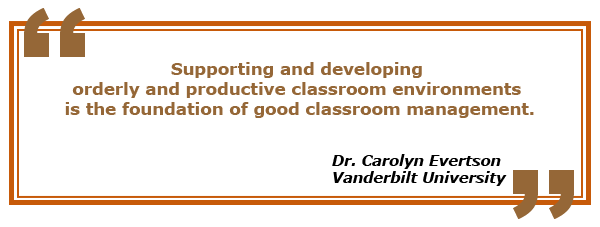
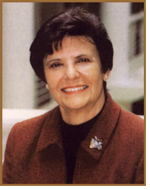 Carolyn M. Evertson
Carolyn M. Evertson

